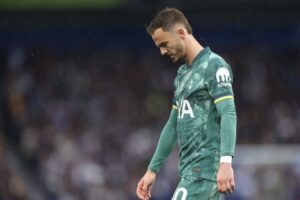Spurs punished by calamitous mistakes or is ‘Angeball’ inherently fragile? Ian Wright gives audacious analysis
 Never in Ange Postecoglou’s Tottenham tenure has he been as disappointed as this.
Never in Ange Postecoglou’s Tottenham tenure has he been as disappointed as this.
There have been bad days before, bad defeats, and moments when Postecoglou’s emotions have got the better of him. But even Postecoglou’s frustration after the defeat by Manchester City in May, when he talked about the “fragile foundations” of what he was building at Spurs, had nothing on this.
Postecoglou looked utterly crestfallen by the end of the game, almost shaken by the disaster he had witnessed on the pitch. After the final whistle, he stood alone in the centre circle, staring into space as the rest of the stadium danced around gleefully. When Postecoglou came in to do his media duties, there was no forced smile, no brave face, no positives taken. He did nothing to hide his emotions from the world.
Why would he? Some defeats can be spun or deflected or brazened out. This was not one of them. This was one of the worst defensive collapses you will see in the Premier League all season. Go back over the years and few would be quite this bad, especially not from a team who want to challenge at the serious end of the table, competing for trophies on multiple fronts.
This was deeply unserious football, three goals shipped in 18 minutes. What looked like a comfortable win, a sixth on the bounce in all competitions, became a humiliating 3-2 defeat in the blink of an eye. Some Tottenham players looked like they had barely even realised the second half had started by the time Danny Welbeck made it three. Few of them looked like they had any ideas about how to turn the tide.Nobody who watched this would say it was anything other than a catastrophe and an embarrassment for Tottenham. Under normal circumstances, Spurs would have another game in three or four days, a chance to go again and reset the mood, but with an international break upon us, the team have 12 full days to agonise over this before the visit of West Ham United on October 19. It is going to feel like purgatory.
When the shock subsides, people will ask: why? How did Tottenham go from 2-0 up to 3-2 down so quickly on a wet Sunday afternoon? What happened to the players during the start of the second half? At half-time, they were well set to win six on the spin for the first time in six years.
All of the frustrations over their wobbly start to the season, the lack of efficiency, the mistakes at both ends of the pitch, would have been washed away. Spurs would have gone into the break one point off Aston Villa and Chelsea in the Champions League qualification spots.There are two possible explanations that Spurs fans can pick between over the next two weeks.
The first is that this collapse was down to the way Tottenham play. Everyone knows that ‘Angeball’ is a high-risk, high-reward approach, a house of cards where everything has to be in place for the structure to hold together. Everyone knows that, throughout the Postecoglou era, Tottenham have conceded big chances, even in games they have controlled, especially on the break and especially on set pieces.Despite their improvements at the back, the Leicester City and Newcastle United games at the start of the season showed old weaknesses remain. In recent weeks, it was beginning to appear that Tottenham had co-ordinated their press and tightened up their defence, but perhaps the loss to Brighton showed that good opponents with momentum behind them will always be able to hit Tottenham where it hurts.
But that explanation feels insufficient, not the full story of what we saw. If you watch the goals back you will see a calamitous sequence of individual errors, missed tackles, botched clearances, abandoned runners behind every single one. These were not systemic tactical faults — it was unprecedented, collective losing of heads from the Tottenham defenders — a widespread forgetting of the simple principles of the game from the Tottenham back four.
This was Postecoglou’s view when he came in and gave a press conference more sorrowful than angry. He was bitterly disappointed with his players and their lack of application, saying that this was the first time since he has been in charge at Spurs that the “non-negotiable” trait of competitiveness has not been there. Even if his manner was downbeat, his words were damning. He called it “the most disappointing loss I’ve had since I’ve been here”. The tone was very different from Antonio Conte’s press conference at Southampton that ended his tenure as Tottenham manager 18 months ago. This was certainly not an attempt to get sacked or to enact pre-meditated revenge on the players, knowing that the end was close — but you could see an outline of similarity between that day and this one, between two Tottenham managers who could not make sense of why their team had thrown away such a strong position.
The difference is that Conte had no interest in fixing the situation by March 2023, whereas Postecoglou is invested in trying to find out why this happened and how he can stop it from ever happening again. Maybe it was complacency, maybe it was fatigue, maybe it was just momentum that went against Spurs which they were unable to reverse. Postecoglou did not do much to reverse the momentum either, it must be said, making no changes until after the game was lost, although he did want to talk about that in detail afterwards.